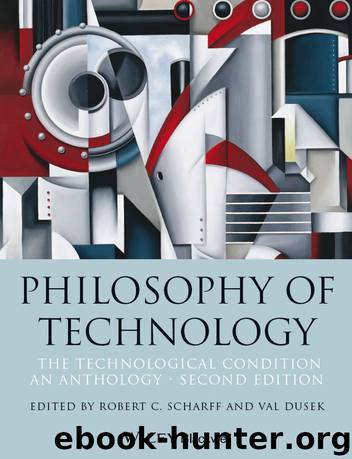Philosophy of Technology by Dusek Val Scharff Robert C

Author:Dusek, Val, Scharff, Robert C.
Language: eng
Format: epub
Publisher: Wiley
Published: 2013-11-27T16:00:00+00:00
31
Philosophy of Technology at the Crossroads: Critique of Heidegger and Borgmann
Andrew Feenberg
What Heidegger called “the question of technology” has a peculiar status in the academy today. After World War II, the humanities and social sciences were swept by a wave of technological determinism. If technology was not praised for modernizing us, it was blamed for the crisis of our culture. Whether interpreted in optimistic or pessimistic terms, determinism appeared to offer a fundamental account of modernity as a unified phenomenon. This approach has now been largely abandoned for a view that admits the possibility of significant “difference,” i.e., cultural variety in the reception and appropriation of modernity. Yet the breakdown of determinism has not led to quite the flowering of research in philosophy of technology one might hope for.
On the one hand, mainstream philosophy, which was never happy with the intrusion of technological themes, sticks happily to its traditional indifference to the material world. Where the old determinism overestimated the independent impact of artifactual on social reality, the new social-scientific approaches appear to have so disaggregated the question of technology as to deprive it of philosophical significance. It has become matter for specialized research.1 And for this very reason, most professional philosophers now feel safe in ignoring technology altogether, except of course when they turn the key in the ignition.
On the other hand, those few philosophers, notably Albert Borgmann, who continue the earlier interrogation of technology have hesitated to assimilate the advances of the new technology studies. They remain faithful to the determinist premises of an earlier generation of founders of the field, such as Ellul, Heidegger, and the Frankfurt School. For these thinkers modernity continues to be characterized by a unique form of technical action and thought that threatens nontechnical values as it extends itself ever deeper into social life. They argue that technology is not neutral. The tools we use shape our way of life in modern societies where technique has become all-pervasive. The results of this process are disastrous: the triumph of technological thinking, the domination of nature, and the shattering of community. On this account, modernity is fundamentally flawed.
While the problems identified in this tradition are undoubtedly real, these theories fail to discriminate different realizations of technical principles relevant to the alternatives we confront. As a result, technology rigidifies into destiny and the prospects for reform are narrowed to adjustments on the boundaries of the technical sphere. It is precisely this essentialist reading of the nature of technology that recent social-scientific investigations refute without, however, relating their nonessentialist conception of technology to the original problematic of modernity that preoccupies the philosophers.2 Here I attempt to preserve the philosophers’ advance toward the integration of technical themes to a theory of modernity without losing the conceptual space opened by social science for imagining a radically different technological future.
I now begin to present my argument with a brief reminder of Heidegger’s approach.
Download
This site does not store any files on its server. We only index and link to content provided by other sites. Please contact the content providers to delete copyright contents if any and email us, we'll remove relevant links or contents immediately.
Learning SQL by Alan Beaulieu(6276)
Weapons of Math Destruction by Cathy O'Neil(6261)
Digital Minimalism by Cal Newport;(5747)
iGen by Jean M. Twenge(5408)
Sapiens by Yuval Noah Harari(5363)
The Age of Surveillance Capitalism by Shoshana Zuboff(4274)
Elon Musk by Ashlee Vance(4120)
Thing Explainer by Randall Munroe(3930)
Apollo 8 by Jeffrey Kluger(3701)
Future Crimes by Marc Goodman(3591)
The Science Book (Big Ideas Simply Explained) by DK(3276)
The Innovators: How a Group of Hackers, Geniuses, and Geeks Created the Digital Revolution by Walter Isaacson(3137)
Who Can You Trust? by Rachel Botsman(3129)
I Live in the Future & Here's How It Works by Nick Bilton(2990)
Infinite Energy Technologies by Finley Eversole(2972)
Steve Jobs by Walter Isaacson(2888)
Dawn of the New Everything by Jaron Lanier(2768)
Chernobyl by Serhii Plokhy(2534)
Ben Franklin's Almanac by Candace Fleming(2521)
